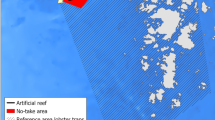Abstract
Artificial reefs have a positive image in the media and the public. However, if they soon appeared as a convenient response to fisheries depletion, there has since been a shift between this ideal perception and a real understanding of their functioning and impact.
The assessment of their actual performance is constrained by a knowledge deficit about ecosystems’ natural variability, the definition of appropriate spatial and temporal scale studies, and the difficulty and cost of field surveys. In such a context, a number of questions can be raised, such as: (1) Is there an increase or redistribution of biological resources? (2) Are habitats a limiting factor for resources under heavy exploitation or limited recruitment? (3) Is ecosystem engineering enough and adapted as a response to resources degradation?, (4) What kind of control may be applied in regard to the system’s possible modification?
In France, artificial reefs are mainly used for the purpose and benefit of coastal fisheries. In this context, multiple experiences may become risky in a free access system and not lead to a significant reduction in marine pollution and degradation sources. In addition, in such conditions, technological improvements could become useless.
Yet the demand is increasing and becoming more diversified. New perspectives are opening with the awareness of better control of uses at sea and the convergence of research-related issues concerning biodiversity, ecological engineering, marine protected areas, and marine areas specifically devoted to renewable energy devices. Besides, the technological improvement of monitoring tools supported by better experimental and follow-up procedures should help to achieve more significant and effective results for the benefit of coastal zone management.
Access this chapter
Tax calculation will be finalised at checkout
Purchases are for personal use only
Similar content being viewed by others
Notes
- 1.
EU Marine Strategy Framework Directive (2008/56/EC)
Author information
Authors and Affiliations
Corresponding author
Editor information
Editors and Affiliations
Rights and permissions
Copyright information
© 2010 Springer Science+Business Media B.V.
About this paper
Cite this paper
Veron, G. (2010). Artificial Reefs: Perceptions and Impact on the Marine Environment. In: Ceccaldi, HJ., Dekeyser, I., Girault, M., Stora, G. (eds) Global Change: Mankind-Marine Environment Interactions. Springer, Dordrecht. https://doi.org/10.1007/978-90-481-8630-3_25
Download citation
DOI: https://doi.org/10.1007/978-90-481-8630-3_25
Published:
Publisher Name: Springer, Dordrecht
Print ISBN: 978-90-481-8629-7
Online ISBN: 978-90-481-8630-3
eBook Packages: Earth and Environmental ScienceEarth and Environmental Science (R0)




